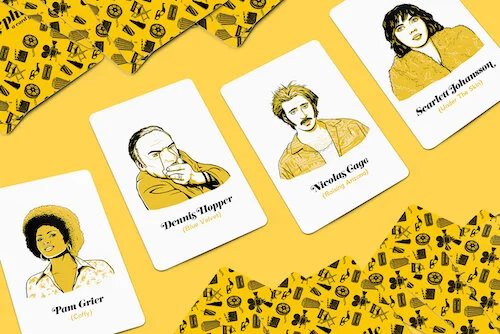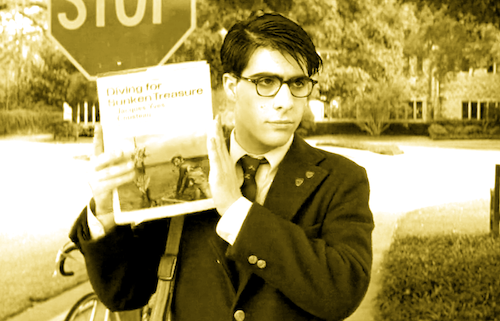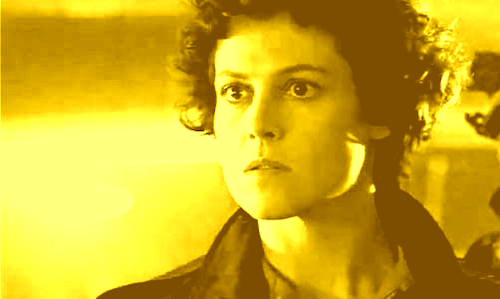Cory Everett and Cinephile: The Endlessness of Film Appreciation
Christmas is around the corner, and you might need to get your film fanatic loved one a last minute gift. Well, we find that the best presents are the ones that last for a lifetime. Our Andreas Babiolakis received such a gift earlier this year, when he was presented with Cinephile: A Card Game. Unlike the film trivia games and most other film related activities, it was immediately obvious that Cinephile had endless opportunities to play, and was genuinely challenging for every level of movie fan (especially since it can be split into different difficulties). From that second, it was clear that this was the film game for our readers to check out. So, naturally, we needed to connect with its creator: Cory Everett.
Everett is an art director and a writer, who has contributed articles to a variety of film related sites including IndieWire and The Film Stage. It only makes sense that both sides of his expertise merged together to make an in-depth game that’s also visually stunning; each card is lathered in what feels like a buttered popcorn bag at the theatre (something we all miss dearly right now). His yellow-white-black style was brought to life by illustrator Steve Isaacs, who took Everett’s initial ideas and made them really pop. As a result, each card is aesthetically vibrant. You can use these cards to play a handful of games, ranging from a showdown between players of who can list the most films an actor has been in (“Filmography”), the puzzle of connecting two random cards in six films or less (“Six Degrees”) and more.
Cory Everett talked with us about Cinephile, and we’re grateful for this fantastic discussion. It was clear that we could have conversed about film for hours with him, given his fantastic film knowledge and his enthusiasm for this refreshing game he created. You can purchase your copy of Cinephile at the official website, as well as expansion packs for the game (with more packs coming soon). Everett and Isaacs also collaborated on a children’s book titled A is for Auteur, which compiles many iconic filmmakers in alphabetical fashion (it’s as much for grown movie lovers as it is for kids). You can follow Cinephile and Cory Everett on Twitter for more updates as well.
Films Fatale: How difficult was it to come up with a film buff game that didn't actually favour the biggest film buffs for once? How long did it take to figure out an even ground for all movie fans to stand a chance?
Cory Everett: I’m a lifelong movie nerd so the genesis of the idea was that I had a group of friends and we went to a weekly movie trivia in Brooklyn for about two years. When the team disbanded, I really missed it. So to fill the void I basically sketched out this idea for Cinephile on a Post-it note. The idea was with one deck of cards you could play the movie nerd games that I had been playing for a decade plus on road trips and days at the beach and what have you. These were “Six Degrees,” which is a spin on the Kevin Bacon game, where I would ask somebody, “Gimme two actors, and I’ll connect them in six films or less”. And another game I called “Filmography”, where you name a movie star, say, Tom Hanks. Then you’d go around naming Tom Hanks movies someone is stumped.
So I thought with one, simple, beautifully designed deck of cards that you can play both of those games. And not only that, but you can play Charades, Heads Up, almost any other movie nerd game that you wanted to play, the same way with a deck of playing cards you can play Blackjack, Poker, etc. So that was where it started. So we launched a Kickstarter campaign and the plan was to produce this independently. But during the campaign, a publisher found our Kickstarter and reached out to us. They’re called Clarkson Potter, which is a division of Penguin Random House and they were interested in partnering to release the game. So originally I thought I was going to do this Kickstarter and we’re going to make it over summer and it’ll be out by Christmas — it ended up being pushed back a full year. I started working on this in February of 2018. It didn’t come out until August of 2019.
And it was during that process where we had this extra year to really develop the game.
So because I had a little more time, we started to consider the idea that it might reach a wider audience than I had originally intended. My wife actually had the idea of folding in some of the other games originally conceived as remixes and ranking them by difficulty in the instructions. So if someone picks up this game for a birthday present and they’re not a big film nerd, I don’t want them to immediately throw it across the room because they can’t play Six Degrees! I want them to have a way in. So to start with Filmography, or Head On, a game that anyone can play. You work your way up to the more difficult games. That’s the long and short of that question (laughs). I wanted to make a game specifically for film nerds, but I didn’t want other people to not have any way to play.
FF: I’ve been with my girlfriend for six years, and it’s been a challenge for her to find a film game that didn’t get solved in five minutes or feel too easy overall. (laughs)
CE: Absolutely! I had the exact same thing, where I got a deck of movie trivia cards on Christmas and was really excited. And I had my wife read them to me, and I sat there for thirty minutes, answered them all, and put them back in the box and never took them out again. The whole idea of Cinephile was that not only can we play all of these different games, but we can continue to add actors from all different corners of film history, and genres and all of this stuff.
Rather than single-use, it’s infinitely expandable. Even if you only play Six Degrees, the odds of drawing the same two cards, statistically, is extremely unlikely. The idea that it’s always fresh and can be anything is essential for film nerds like me. So far, the reception has been good! It’s been everything that I had hoped.
FF: Somehow, my girlfriend knew that this was the game for me just from the design alone. It was sold out everywhere, but she wanted to get this particular game for me for our anniversary. She was right, as we spent hours playing this the day of. Before I continue, I just wanted to say thank you for this game that I can see myself playing for years.
CE: That’s amazing. That’s what I hoped. My day job is working as an Art Director in advertising. So that design component was a big part of the game from the very beginning. I had pitched it as “the Criterion Collection of card games” and wanted to create this beautifully designed object. So even when you’re not playing it, it would look great on your shelf next to your Blu-rays. And a huge part of that was the illustrations. Steve Isaacs is a friend of mine and also a hugely talented illustrator. He’s been my partner in bringing Cinephile to life. I had the initial idea for the game and the colour scheme -- yellow, black and white -- all figured out but I didn’t have the illustrations.
My initial idea was much simpler — almost more crude — but once Steve came on board the look of the game really came to life and became elevated to something much better than I’d initially imagined. The portraits are so great, they’re so detailed, and they really capture the actors. So I’m always excited to see what he does. I wanted people to have the feeling of when they are turning over a card [to have] that sense of surprise and discovery.
FF: There are some very interesting performers and film selections here. Did you purposefully try to create curve balls (like using The Man in the Iron Mask instead of a more obvious Leonardo DiCaprio film, or having Rinko Kikuchi)? With Kikuchi (whose work I don’t know too well), the film attached is Pacific Rim, so that makes it easier for me to link it with someone like Charlie Day, for instance.
CE: Yeah there’s always a way out.
The other idea of the game is that there are twenty five movies that are so embedded in culture, that they feel like they’re done to death. It’s not that they're not classics or not great. But film culture runs so much deeper and I wanted Cinephile to reflect that. So while I wanted anyone to be able to get this game and get it out of the box and be able to play, I really wanted the choices of actors and films to speak directly to the real film nerds.
So for example, Al Pacino. You think of The Godfather, you think of Scarface, you think of Heat. Not that these aren’t great movies, they are! But we’ve seen these before. So when I’m choosing a movie for the Al Pacino card, I’m going with Cruising: the William Friedkin biker bar, S&M, cult movie that’s had something of a resurgence in the past couple of years. Not only is it Al Pacino with this amazingly coiffed hairdo and leather jacket, but it’s not the same portrait of him as [Tony Montana from] Scarface that we’ve seen before.
For the deck you want a mix of character actors and movie stars so when you’re choosing movie stars, you want to go with some of the less obvious roles. Movies that I — and the rest of Film Twitter — love. With Tom Cruise, I’m going with Eyes Wide Shut, because it’s probably my favourite Tom Cruise movie. But it’s not what most people would think of for Tom Cruise. I thought that if I spoke directly to other film nerds like myself, they would feel like this was made for them. It completely was.
FF: Exactly! With The Man in the Iron Mask, though, in one game, getting Leonardo DiCaprio is easy, but playing a game where the film on the card matters becomes much more difficult. So how did you make these curveballs that weren’t impossible either way (but still a nice challenge)?
CE: The only rule that I have is that every actor can only be used once, and every movie can only be used once. No matter how many expansion packs we do. Once you do a Jeff Bridges from The Big Lebowski card, you’re never going to see a John Goodman card from that movie, or anyone else. That movie is now off the table. You’re trying to juggle “How am I going to get all of these beloved movies in there?” and “Which actor for which performance?” There’s general rules I use but those rules get broken if I decide I want to put in the movie that I want to see. Were there more under-the-radar Ryan Gosling movies than Drive? Yeah, but I wanted to do Drive -- even though that's the one that’s been done to death -- because I still love that movie.
FF: Of course! Us too!
CE: With Leonardo DiCaprio, it became the joke of arguably the world’s biggest movie star and
the most famous face: “Let’s go with the forgotten movie, where you don’t get to see his face!”
FF: He’s literally in an iron mask! It’s in the title!
CE: Yeah! And hopefully that provokes a laugh from someone playing for the first time. For other actors, like Nic Cage for example. He’s in another stage of his career where people are like, “He’s always so ridiculous and in these unbelievable movies,” so I want to go the other way and say, “Yes, but actually, Nic Cage was fucking great in Raising Arizona”. So that’s the film we use for his card. Pacific Rim is not a universally beloved movie by any means, even with Guillermo del Toro fans, but it’s a movie I love so it goes in. If the game was the 150 most famous people at this moment, it wouldn’t be as fun to play. And it would be easier to make connections. If you reach back to the late ‘60s, how do you jump from there to a more modern actor? It’s what’s fun about playing some of the games. It stretches your knowledge.
The fun thing is both acknowledging the canon of films that people talk about, and getting to -- in a small way with the game -- nudge that and play a part in that conversation. The hope is that the game will help with discovery too so if a younger cinephile sees something, say the Catherine Deneuve card for Repulsion, they might not have ever heard of it. It doesn’t mean they’re going to rush out and immediately seek it out but maybe the second or third time they come across that title, they’ll see it pop up on the Criterion Channel or if someone on Letterboxd has reviewed it, it’ll be something already on their radar. And if the second or third push encourages them to finally check it out. The idea that you can play some role in the conversation of film culture is also exciting.
FF: I love cinephiles that try to educate others and share the medium, not the kinds that sit on a perch and judge people for not having seen a film. Speaking of sharing your love of movies, you seem to like a wide variety of eras and genres. What was the first when you first became a cinephile? What was the beginning genre and/or time period you were hooked on, before it led to everything else?
CE: A lot of my formative movie memories were going to the movies with my dad. Back when I was an only child for a few years, my dad would take me to the movies, and it was always a really exciting experience. Something about the ‘80s — before the age of every single superhero movie and family movie — it felt like you had to roll the dice on stuff that might fit the bill. I feel like he ended up taking me to a lot of stuff that he wanted to see, but also thought that I might like. Going to see things in the theatre like The Monster Squad or Robocop when I was six years old (laughs). Those kind of action genre movies were my superhero movies. I grew up watching anything that had Arnold Schwarzenegger, Sylvester Stallone, Kurt Russell and so on had done. Those guys were kind of my Avengers when I was in elementary and middle school. From there, you start discovering everything. In high school, you start renting all the Godfathers and Apocalypse Now that you’ve heard about and just branching out from there.
FF: We like to send interviews off with the most basic question, based on why we are all cinephiles. What are your top five films of all time, and why?
CE: I haven’t updated this in a long time so I’ll just go with my gut.
It’s a Wonderful Life
(1946)
CE: My favourite movie of all time is It’s a Wonderful Life. My family watches it on Christmas Eve every year, and I really love it. It kind of isn’t the movie you think it would be if you’ve never seen it. It is a much darker and deeper movie. It has great performances and it’s a movie you walk away from re-appreciating your life, which is a subgenre of movie I really respond to.
The rest of the top five are in no particular order.
Magnolia
(1999)
CE: Maybe not Paul Thomas Anderson’s best movie, but the movie that was the most movie at the age I needed it the most.
Rushmore
(1998)
CE: A movie I completely did not get the first time I saw it, rented from Blockbuster Video. But one that quickly became one of my favourite movies of all time.
Batman
(1989)
CE: A movie I saw so many times as an eight year old, I literally had the opening credits memorized.
Aliens (1986)
CE: The Alien movies were big for me as a kid and this is one I am constantly impressed by
whenever I go back to watch it.
FF: You’ve seen so much, but a big portion of your favourite films are works that left a big impression on you throughout your life. Whether you were a child or coming out of film school. That’s amazing. To go back to It’s a Wonderful Life, you bring up a good point because it’s got this label of only being a holiday film. It’s arguably Frank Capra’s darkest film. It’s so much more than what it’s known for.
CE: It’s also playful, and inventive. It’s all the things at once. The fact it was made in the late ‘40s blows my mind: how modern it feels. Bedford Falls is this idealized Americana, but the character relationships still feel so real to me. Jimmy Stewart’s frustration feels so relatable. I think it’s a great movie.
We thank Cory Everett again for sharing Cinephile and his passion for film with us. You can visit the official Cinephile website to purchase the game and expansion packs, or to purchase his children’s book A is for Auteur. Follow Cinephile and Cory Everett on Twitter for updates on the game, including future expansion packs and more.
Andreas Babiolakis has a Masters degree in Film and Photography Preservation and Collections Management from Ryerson University, as well as a Bachelors degree in Cinema Studies from York University. His favourite times of year are the Criterion Collection flash sales and the annual Toronto International Film Festival.












